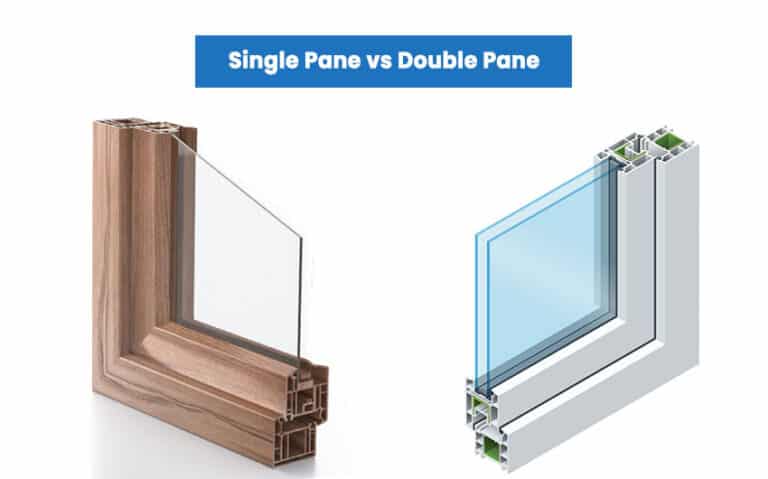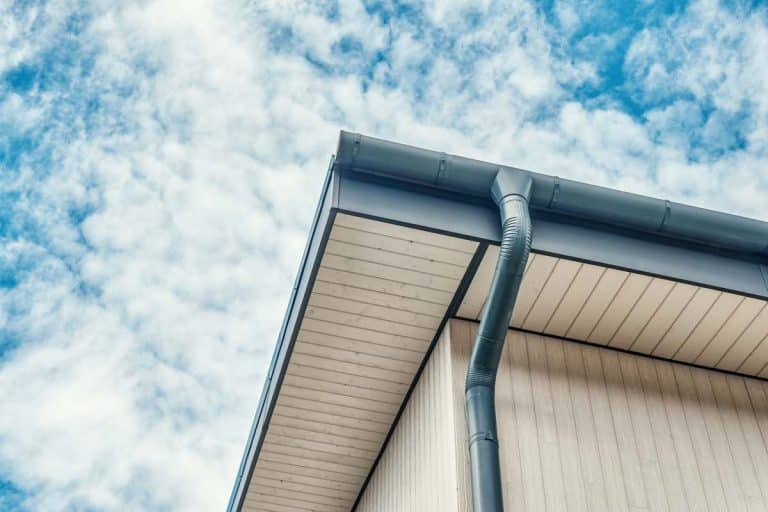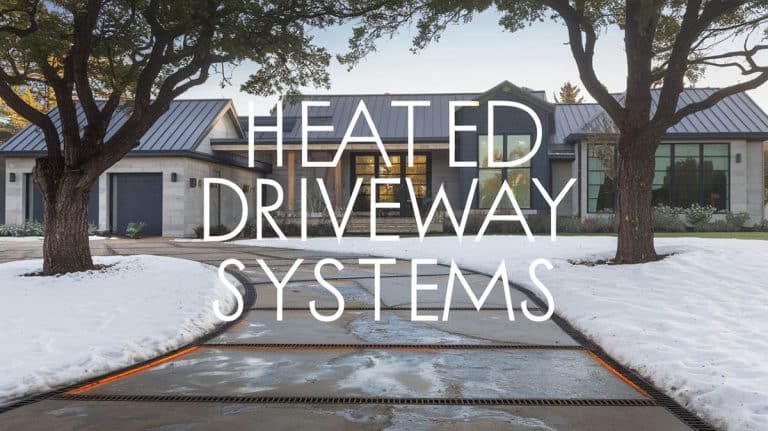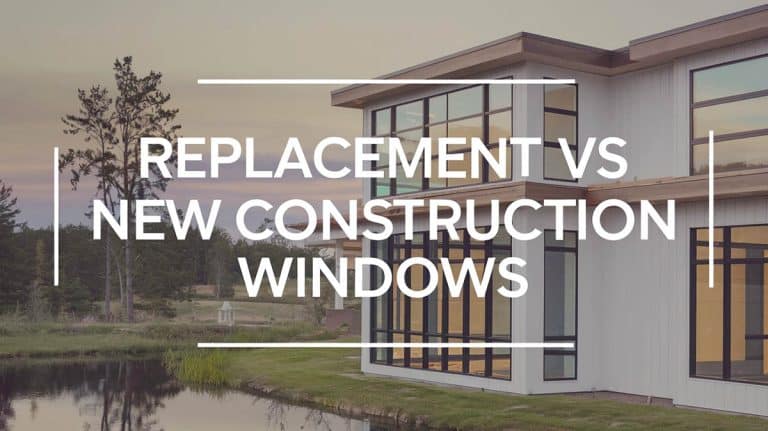21 Types of Driveways (Best Design Ideas)
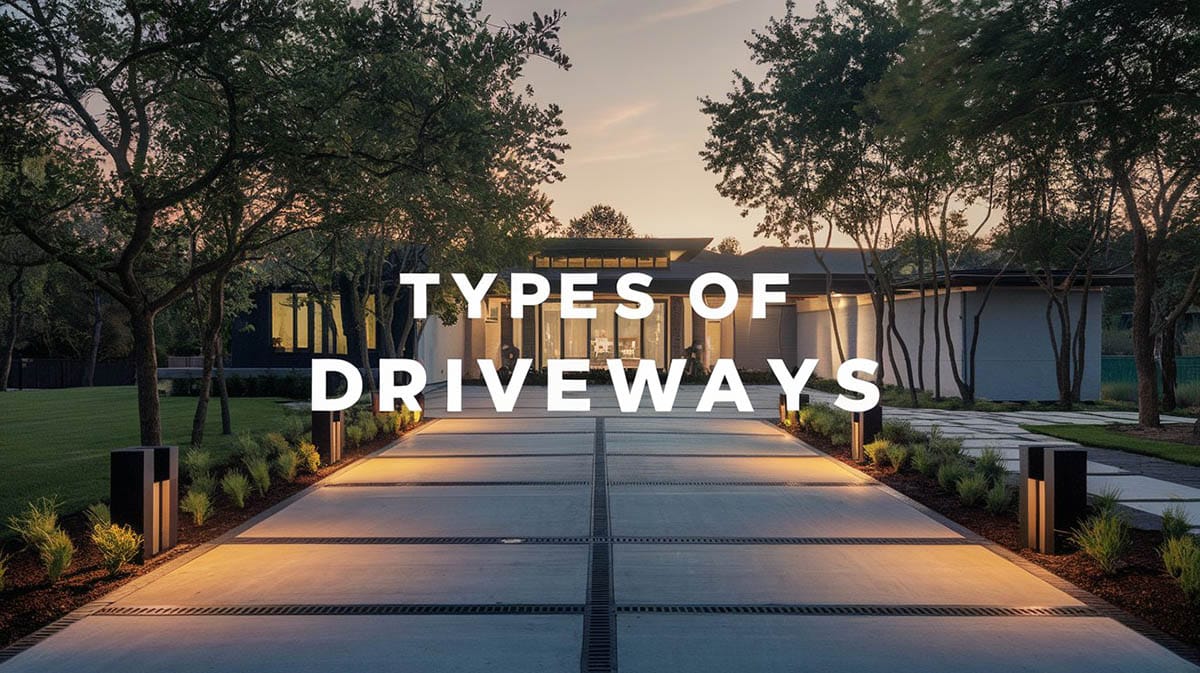
Driveways are something that is used almost every single day! Whether coming and going in your car or shoveling snow a driveway takes some serious wear and tear. Therefore, weighing all the pros and cons of the different types available will help you find the perfect driveway for your home! Knowing and taking proper care of your driveway, whatever material it is, will give it the longest life and keep it looking good. First, you will need to decide on the materials to make the driveway out of. This can range from bricks to dirt and everything in between. It is good to remember your budget, climate, how much use the driveway will see, and the aesthetics you wish to have. All of these factors will play a role in the effectiveness of the driveway. After that, picking the size and shapes of the driveway will be a breeze.
Quicklook: Different Material Types For Driveways
- Concrete
- Stamped concrete
- Ashpalt
- Tar and chip
- Brick
- Paver
- Cobblestone
- Gravel
- Crushed stone
- Dirt
- Grass
- Concrete and grass
- Recycled grass
- Mixed material
Driveway Materials
Here we share the different materials used to construct driveways.
Concrete Driveway
Concrete driveways are a common choice for paving. This type of driveway offers quite a few benefits! Concrete driveways are exceptionally durable, which is one of the prime reasons most people lean towards this choice. Concrete driveways will typically last around 40 years without maintenance, repairs, or replacement. Concrete can withstand a lot of daily use, which is beneficial since most people will use their driveways or have a car sitting on it every day.
Durability – As long as the concrete driveway is installed correctly, it should be there for years to come. The only downsides to concrete are that it stains easily, and de-icing solutions can cause a quicker breakdown. In addition the drying process may take a few days, which will mean no use of the driveway for that times. Visit this page to learn more about heated driveway systems including those made from concrete.
Price – The price of concrete is reasonable, ranging from $3 to $10 per square foot.
Maintenance—When getting a concrete driveway, it is sometimes relevant that a concrete driveway sealer is used. This product will extend the product’s life and improve the appearance of the concrete by adding a glossy factor. Sealing a concrete driveway is a one-day task that is not very difficult and does not require many expensive materials.
Sealing – When selecting a driveway sealer, one should take into consideration the safety, appearance, and performance. The slip resistance will be a large factor based on the amount of texture that the concrete has.
A “wet-look” sealer will be the most slippery while a stamped will look similar but be less slippery. For maximum slip resistance a low gloss sealant or adding anti-skid additives to the sealant will be the best bet.
The gloss level will also affect the appearance of the concrete. As for performance, based on the product, sealer will typically add 1 to 3 years to the life of the concrete. In most cases, lower costing sealant will last a shorter amount of time then the higher costing products.
Stamped Concrete Driveway
When diving deeper into the appearance category of the driveway, stamped concrete driveways are an option that helps with decorative features. Stamped concrete is a pretty cost-effective way to make a driveway look like something it is not.
This feature will allow you to change the color or patterns of the concrete while still having the ease of poured concrete versus individual paving. Stamping concrete will allow for great visuals similar to cobblestone, field stone, and even brick. These will keep the same general price of concrete with a different look to it.
The maintenance and life length will also be the same as regular concrete driveways. Stamped concrete will typically be used in situations where the aesthetics and budget are important to the user. For example if you are looking at doing a brick driveway and the price comes out to be just too high, stamping the concrete to resemble bricks will be a great way to get the best of both worlds.
Asphalt Driveway
Asphalt driveways are an even more affordable and widely used driveway option. They are made from materials such as asphalt cement, rocks, and sands. This product only comes in the color black, sometimes referred to as “blacktop.”
Though asphalt doesn’t allow for color selection or any customization, the low price is an considerable factor. The cost for an asphalt driveway typically ranges from about $3 to $5 per square foot. Asphalt is generally much cheaper to install than concrete, however it will require more maintenance especially in areas with a colder climate.
Asphalt dries and settles in only a few hours. Asphalt is also an easily repairable product with good durability in temperatures changing settings. Unfortunately, asphalt will requires resealing every 3-5 years and regular resurfacing.
Concrete vs Asphalt Driveway
Concrete and asphalt driveways are two of the more commonly used driveway surfaces. This is because the price compared to the length of life is average and its what most people can afford or are willing to spend for that length of time. Concrete driveways will be a little bit pricier than asphalt, making asphalt more popular among budget-cutting individuals.
The appearance of asphalt is pretty basic; it only comes in the color black. This is why more aesthetic-seeking people are more likely to go with a concrete option, as concrete offers more choices for colors and styles. Another factor when choosing between concrete and asphalt is the install time.
Concrete can take days to dry while asphalt takes only a few hours. This means that the cars that usually hold residence to the driveway will only be displaced for a short time. Based on your needs in addition to your location will help choose between the great choices of concrete and asphalt driveways.
Tar and Chip Driveway
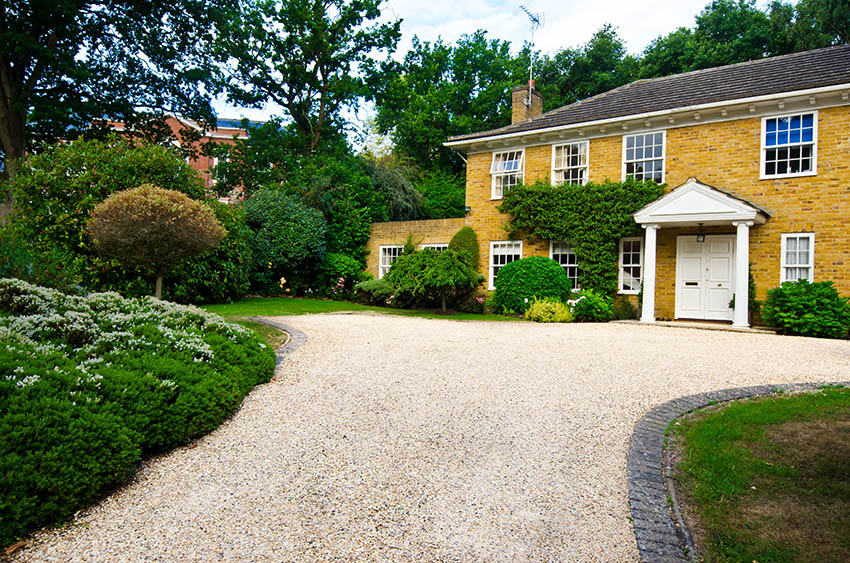
A tar and chip driveway is a somewhat less familiar term, but it is still commonly used. It is made with a gravel base and a layer of loose stones. From there, those materials are rolled into the asphalt to finish it. This type of driveway is an alternative to an asphalt driveway when costs are a concern without downgrading all the way to gravel since it mixes the two materials. Not much maintenance is required for a tar and chip driveway, and sealing is not necessary.
Unfortunately, a tar-and-chip driveway is susceptible to damage during snow removal. Sometimes, some of the stones will be misplaced and leave holes, but these are usually pretty fixable.
Typically, a tar and chip driveway will last about 7 to 10 years, and after those 7 to 10 years are up, adding another layer of stones and tar will be enough to bring it back to life, not taking up too much money or time. The cost for a tar and chip driveway is about $2 to $5 per square foot, which is right around the same pricing as the asphalt driveways.
Brick Driveway
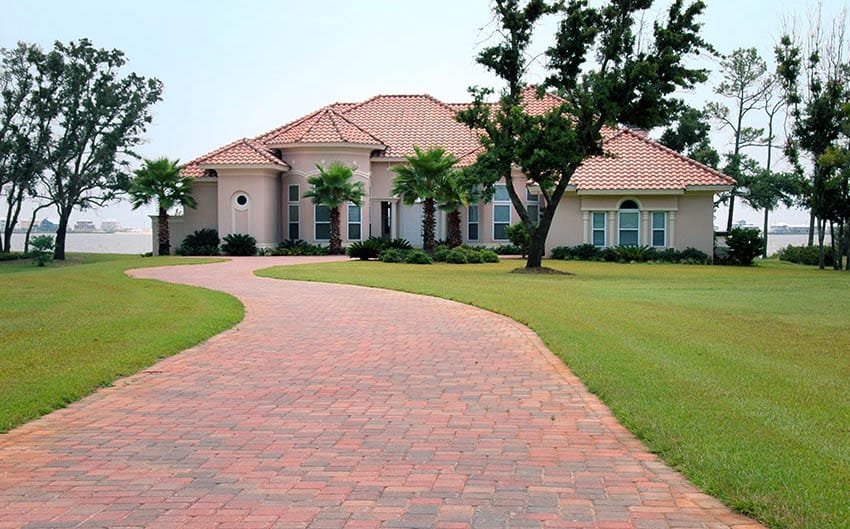
Brick was the most commonly used paver when they first started paving driveways and streets, and it gives it a classic look that many people desire. While this method will add a timeless, striking look, it will hit the wallet pretty hard compared to the typical concrete or asphalt driveways. Bricks offer a wide selection of colors and textures, making the driveway completely customizable.
The durability is not the best on the market; some bricks may crack, shift, or break. However, they can be easily replaced without having to repair the entire driveway, which makes for easy and less expensive repairs. For maintenance, you should plan to wash the driveway a few times a year.
Sealing the brick will also give the best possible outcome, but will add a few bucks to the price. If sealed properly and taken care of a brick driveway could last up to 25 years! Though installation can be a do it yourself project, it requires a lot of manual labor.
Hiring someone to do the work will be costly but will mean the jobs gets done right which will affect the life length and appearance of the driveway. The price for a brick driveway will be from $10 to $30 per square foot depending on installation and material choices.
Paver Driveway
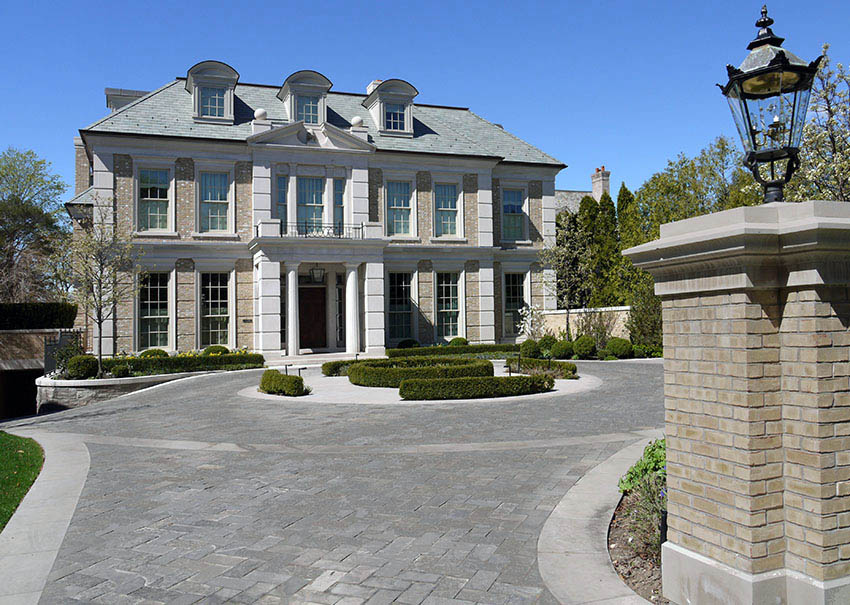
A paver driveway uses interlocking pavers typically made of concrete or cement. Pavers are available in an array of shapes, sizes, patterns, and styles; basically, your options are only confined by your creative ideas. Due to the interlocking quality of the pavers, the speed of the installation and the strength of the paver driveway are very good!
This sort of driveway will be aesthetically pleasing in almost any situation due to the wide variety of options to choose from. The pavers will not require much maintenance, just a quick sweep here and there. Sometimes weeds will sneak through the cracks, but just pull them out and they will not cause a problem. If any stains happen, different concrete cleaners can help clean the surface.
Typically, if everything is done correctly, a concrete paver driveway can last up to 50 years! The pavers you choose will greatly affect the cost. Some pavers alone will cost around $3 to $10 per square foot, but depending on the style and installation methods, the price could jump to about $30 to $40 per square foot.
Clay Brick Paver Driveway
Clay brick pavers are less durable than concrete, but they are affordable and make an attractive-looking driveway. They are constructed in formas that are heat cured in a variety of shapes, most often rectangles. There is a wide assortment of design types to choose from to match a modern, contemporary, or traditional-style home.
Interlocking Driveway Pavers
Interlocking paver driveways provide an old world charm that’s ideal for a home’s curb appeal. Good quality interlocking pavers are constructed from concrete. They are durable, provide a stable driveway surface and require little maintenance beside sealing every few years. The cost of interlocking pavers range from around $6 to $8 a square foot. However, there are a wide variety of manufacturers and your cost will depend on the material you choose and local labor and installation costs.
Cobblestone Driveway
Cobblestone driveways give an even older, more classic look; the more added character, the higher the price tag. If you thought installation was hard for brick pavers was hard, just wait until you see the fun that cobblestone throws at you! The great thing about cobblestone is that any wear and tear brought to it just gives the stone more (free) character.
The only maintenance this product will need is pulling any weeds that try to sneak through the cracks. Similar to brick, its lifespan is up to 25 years! Unfortunately, the price on cobblestone will run you about $20 to $70 per square foot. Due to the high cost, this is typically seen in upscale areas or when people have extremely short driveways.
Sealing and washing cobblestone will help the large purchase stay looking good for as long as possible. Sometimes, using cobblestone as an accent, inlay, or border will help you use the product without completely destroying a budget.
Gravel Driveway
Gravel driveways are one of the most cost-friendly driveways, only higher than natural driveways such as grass or dirt. These types of driveways are most commonly used in rural settings and are made from different sorts of clay, rocks, and sands. Gravel driveways are great for long driveways, typically in the country.
Unfortunately, gravel is a loose material, so it is easily misplaced. If too much gets away, maintenance such as raking misplaced gravel and repairs to the driveway can be necessary. Driving too quickly over this type of driveway can also rack up dust.
Though the durability is lacking it is still a viable option for people looking for a cost efficient driveway because luckily this is outweighed by the cost of $0.75 to $3 per square foot!
Crushed Stone Driveway
Creating a crushed stone driveway will be another attractive and fairly durable, lower-cost alternative to materials such as concrete or asphalt. This is because it is a permeable product, meaning things like rainwater will penetrate it, rather than running off. Crushed stone will be very similar to a gravel driveway in terms of composition and maintenance issues.
Crushed stone driveways are typically made of stones and pebbles, differing from gravel because they do not include sand and clay products. This will make it look a bit more elegant. Snow removal will be pretty difficult, and over time, the rocks will move, which may necessitate throwing some more rocks down, but that will be pretty inexpensive maintenance. Similar to gravel, it will stir up some dust and can often collect rocks on the grass besides it, but for long country driveways, it should not be much of an issue.
Crushed Basalt Driveway
A crushed basalt driveway will also be extremely similar to gravel and crushed stone driveways, just consisting of different materials, in this case crushed basalt instead of crushed stone. Due to its dark color, this material will give a clean and elegant look.
The functionality of the crushed basalt is surprisingly good, except when there is constant snow removal. The nice thing about crushed materials is that they require little to no repairs since there is no way to break them, the worst that can happen is some stones fall out or get stuck to something. With the occasional throwing down of some more material, this driveway should be good to go for as long as you are. Crushed basalt is a less dusty material and will typically be used in upscale locations with longer driveways.
Dirt Driveway
A dirt driveway is the simplest and most inexpensive to install. Most of the time, the dirt is already there; just drive over it a bit, and it will leave tire tracks and become a driveway.
There are some downsides to this seemingly simple answer to a driveway. Where there is dirt and rain, there is mud. A dirt driveway will turn into a mud driveway when the rain starts coming down, which can be an issue for small vehicles. Dirt driveways will also be, well, a little dirty. Dust can blow off in the wind or when cars drive over it.
Often, people start off with a dirt driveway and, once they have more money to spend on the project, add stone or gravel to the top of it to add some extra stability. Similarly, a grass driveway will be just as much of a simple and easy solution, in this case, the location just being covered with grass instead of dirt.
These types are often used in country settings with different sorts of equipment driving through and over it. Certain residential areas will require there to be a paved surface as the driveway which will take these types of driveways out of the running.
Concrete and Grass Driveway
A contemporary concrete and grass driveway is a modern alternative to bare dirt. To achieve this design, concrete pavers must be poured into the desired shape and then seeded with grass in between. A grass and concrete driveway is stylish and brings a natural and contemporary design to the front yard.
Recycled Glass Driveway
Not to be mistaken for an actual sheet of glass that you can drive on, a recycled glass driveway looks like a mosaic made from recycled glass and resin. The materials used to make this driveway will allow for a variety of colors to choose from, based on the colors of glass available. These driveways are environmentally friendly due to the nature of the recycled glass materials used, which can be a huge perk to those keen on saving the environment. The resin in the mixture will add a great durability factor to the product, making the maintenance for the driveway slim to none.
When it comes to price for an environmentally friendly, beautiful product, it is a reasonable $9 to $18 per square foot. (Compare it to cobblestone, and your wallet will jump in joy!) This choice could be made in most settings since it is not a ridiculously high price and will add a beautiful touch to any landscape plan.
Mixed Material Driveway
If picking just one is difficult for you, a mixed-material driveway may be the perfect fit! In a mixed-material driveway, you can choose from any different type of driveway and combine them.
Maybe you love the cobblestone look, but the price is a bit hefty for the entire project; you could combine an asphalt or concrete driveway with a cobblestone border! You could even do a dirt or gravel driveway lined with pavers, keeping prices down while still having some form of structure.
Prices on these types of driveways will greatly differ based on the materials that are chosen. Often this type of driveway is selected with cost savings and style kept in mind.
Maintenance and the length of life of the driveway will also greatly vary based on the materials, so researching each material before selection will be an important step. If one of the materials expands and contracts with the weather, and another material stays firmly in place, you will need to take precautions to avoid causing damage to one of the surfaces.
Maintaining one material may be harmful to another, for example pavers will need to be swept on occasion, but if you were to pair it with a dirt driveway, sweeping a dirt driveway will not be a wise decision.
Types of Gravel Stone for Driveways
The gravel and stones used for driveways will be graded by the types of stones included. When creating a driveway, multiple different grades are commonly used. Often, the bottom layer will use a grade 3 stone, which will be stones roughly 1 to 2 inches in diameter. Another common bottom layer will use grade 4 stones, which can be golf ball-sized stones.
Gravel can be obtained from the river beds or by crushing the stone. – Highway Engineering, Professor T.D. Ahuja
For the upper layer, grade 57 stone and 411 will be used. 57 will be machine-crushed and about the size of a gold ball. The uppermost layer will be 411, which is smaller and has a more coarse texture. Sometimes, when adding more decorative features, people add river rocks, marble chips, pea gravel, or quarry process stone.
The types of stones selected will also depend on your driveway type. For certain gravel driveways you will want larger rocks, to cover more space. For smaller driveways smaller rocks are able to be used because they will be less likely to be disturbed by speedy drivers. Each type or stone will also have a unique appearance that will be a large deciding factor. For example, choosing between crushed stone and crushed basalt will be an aesthetic decision since both materials have the same general qualities and price.
Driveway Cost
Cost is one of the most important factors in any home design project. Driveways can either be a small project or a huge project, depending on the length, shape, and materials included. Those with long driveways will often stick with the lower-cost driveways, while smaller driveways can be more creative since they have less area to cover. Some of the general costs to get you started are as follows.
• Concrete driveway cost: Typically about $3 to $10 per square foot.
• Asphalt driveway cost: Typically about $3 to $5 per square foot.
• Gravel driveway cost: Typically about $0.75 to $3 per square foot.
• Paver driveway cost: Typically about $2 to $10 per square foot for the pavers alone, and about $30 to $40 for pavers and installation.
• Recycled Glass driveway cost: Typically about $9 to $18 per square foot.
• Cobblestone driveway cost: Typically about $20 to $70 per square foot.
• Brick driveway cost: Typically about $10 to $30 per square foot.
Keep in mind that a typical driveway that will fit two cars side by side will be about 20 to 24 feet wide and 30-35 feet long (depending how far the garage is from the street). Multiplying these by the price will give you a rough estimate of how much a driveway will cost you overall.
Multiple other factors will cause the price of a driveway to fluctuate. Additional landscaping, the type of materials used, or elements such as adding a driveway gate can also increase the price. Installation will be a big part, especially for tough pavers such as bricks and cobblestone. It is good to get a materials and installation quote before making the final decision. Making the project a do-it-yourself project can also save some bucks (that is, if you are handy enough).
Sometimes spending more money up front will save you in the long run. For example, some of the materials are more expensive because they are more durable and last longer. This will save from costly repairs or having to redo the entire driveway, and over time this could actually be a money saver. Another thought that will cause prices to change is the style and color, while most products have their standard colors, customs are also usually available, but at a premium.
Driveway Shapes
Picking the shape should be a breeze after selecting the type of driveway you will be using. Typically, only one type or two types will make sense in any particular situation. This makes for easy selection on your part! Also beware that certain locations will have ordinances or rules on how many exit and entrance points a driveway may have onto a road. Checking local codes before building a new driveway will save you! Some of the most common shapes of driveways are as follows:
Straight Driveway
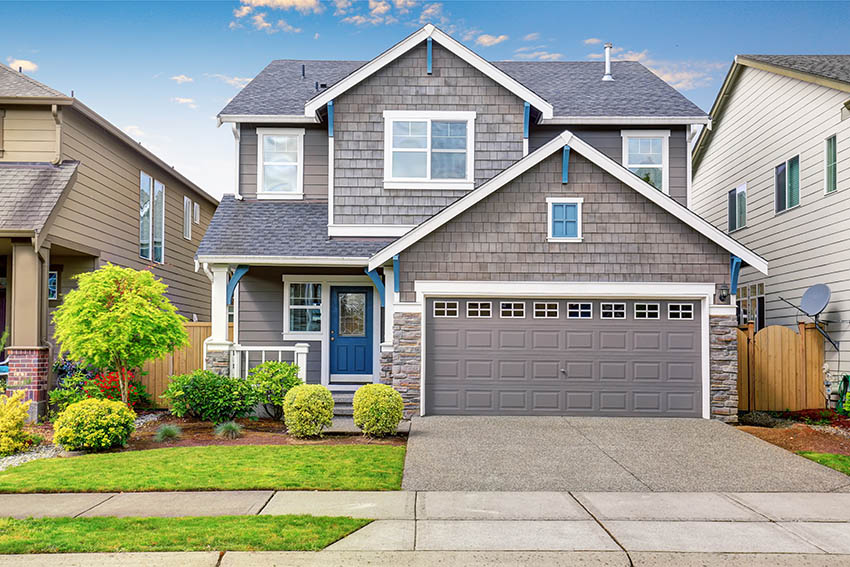
A straight driveway is pretty much how it sounds, straight. These will be used when there is a short distance from the street to the garage, usually with a small yard. This will keep the driveway simple and functional while not occupying too much of the precious yard space. A long driveway can also be used and will give an estate-like vibe. Long straight driveways are commonly lined with trees or plants, leading the driver to the house, making it seem more of a focus and putting the home on display.
Circular Driveway
A circular driveway is a popular driveway because it usually does not require the user to put the motor vehicle in reverse. These types of driveways can have two street entrances and are circular. Circular driveways are also available in a teardrop shape, where the driveway will only have one point of entrance to the street because it connects with itself before then.
A circular driveway requires a large property because it needs to make the loop without any harsh turns. These driveways can be set up in a variety of ways, depending on the layout of the site. They can have an entrance on more than one street or can circle around in one section. A circular driveway will also allow for landscaping features to become a focal point. A center driveway island can be used as a focal point for statues or fountains to make a grand first impression.
U-Shaped Driveway
U-shaped driveways are also as they sound, shaped like a U. These driveways are also nice because they do not require a driver to back out. U shaped driveways will have two points of access to the street. These are often used when a full circle driveway is not an option due to space. This will still give the driver a way out without backing up and will avoid the confusion of multiple point turns to turn around.
Curved Driveway
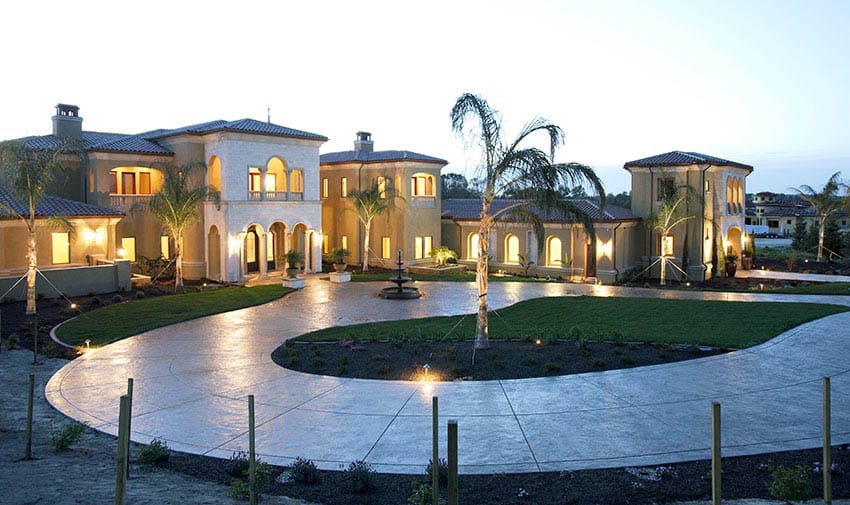
A curved driveway is applicable in many situations. Sometimes the street access does not go straight to the garage, so the use of a straight driveway would not work. Other situations can include natural obstacles and man made features that will obstruct the straight line from the street to the garage. When creating a curved driveway, it must be kept in mind that there are many different types of vehicles and drivers that will need to use said driveway in the future. This will mean that you will want to avoid and sharp curves or having curves too close to the entering or exiting points of the driveway.
Y-Shaped driveway
Once again, the description follows suit of the name and a Y shaped driveway will be shaped like the letter y. This will have one street entrance and the driveway will go to two places. This can be if there are two garages or if there is a garage and an extra place to park something like an RV or a boat. It could also be a great idea if you have kids who want a basketball hoop (that will keep them from hitting your car!). These could also be used if there is a natural or man-made feature in the way, needing to break the driveway up. These are a lot less common shapes of driveways, but they have great use.
Visit this page to see our gallery of modern driveways for more design ideas.

